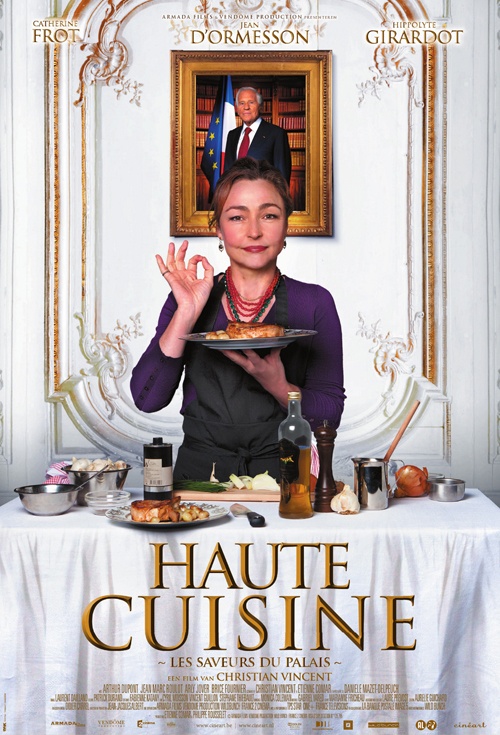Title: Haute Cuisine
The Weinstein Company
Director: Christian Vincent
Screenwriter: Etienne Comar, Christian Vincent
Cast: Catherine Frot, Arthur Dupont, Jean d’Ormesson, Hippolyte Girardot, Jean-Marc Roulot, Philippe Uchan, Laurent Poitrenaux, Hervé Pierre, Brice Fournier
Screened at: Dolby24, NYC,9/10/13
Opens: September 20, 2013
If Hortense Laborie (Catherine Frot) knew that Bill Clinton would adopt a simple vegan diet she would be both disbelieving and horrified. Horrified. To her a diet is a disease, any diet, a point that has her quoting Montesquieu in Christian Vincent “Haute Cuisine” to the effect that, well, a diet is a disease. Watching her prepare dishes for the President of France she turns Hippocratus’s dictum “Let food be thy medicine” on its rear end. Full steam ahead would be her motto, as she slathers on the pig fat, the foie gras, and pretty much all the foods that would scandalize anyone in this country who gives a fig about animal welfare.
The story is based loosely on chef Daniele Delpeuch, who was the personal chef for President François Mitterand during the early 1990’s. Vincent uses a framing device which is recalled now and then as a contrast between the elegance of the Elysee Palace and the chef’s role as cook to a group of macho men doing research on an island in the Antarctic. Catherine Frot commands the film, taking charge whether she is surrounded in the Antarctic by humble men or giving orders to her chief assistant in the Elysee Palace. Looked upon at first with suspicion by the denizens of one of the coldest spots on earth, she also becomes the enemy of a fellow chef in the Palace (Brice Fournier) when she criticizes his dessert as “impersonal.” When after a delay she hears what the French president really wants on his table, she’s surprised that it’s simple home cooking, but home cooking in France is hardly meat loaf and mashed potatoes which is how home cooking is defined on our side of the Atlantic.
Hortense proves this time after time in giving the audience cooking lessons using the imagination that was prominent in “Babette’s Feast,” Gabriel Axel’s 1987 film about an ultra-religious 19th century Danish Protestant sect living on gruel who, after taking in one Babette as a housekeeper, are treated to a lavish banquet with exotic foods imported from France. When Hortense defies protocol at the Elysee by using suppliers not on the approved list, she is castigated by the bean counters while glorified by the president (Jean d’Ornesson), who in one scene enjoys private time with Hortense munching on a sandwich of truffles like the ones his grandmother used to make.
If Vincent, whose script was co-written by Etienne Comar, has a single major point to make, it is that there is more fun, more rewarding to serve a group of simple people in the earth’s most remote region than to fit into the bureaucracy of the French court. Vincent is fortunate in having Catherine Frot as his lead, a woman who convinces us that she does not take kindly to official protocol and in doing so is endeared by Mitterand and the Antarctic crew as well. The principal flaw is that we know little about Hortense aside from her being at home on a farm. Why is she not married? What sort of life is she living on her farm? What are her views on French politics in the nineties? In fact the film gives the impression that the Mitterand has far less on his mind than Louis XVI as he acts more like the food critic of Le Monde than a man who must deal with supplying the Rwandan army with weaponry after the assassination of Juvénal Habyarimana and the sinking in New Zealand of a Greenpeace vessel, the Rainbow Warrior, which was protesting French nuclear testing in the South Pacific.
Rated PG-13. 95 minutes © 2013 by Harvey Karten, Member, New York Film Critics Online
Story – B
Acting – B
Technical – B+
Overall – B

